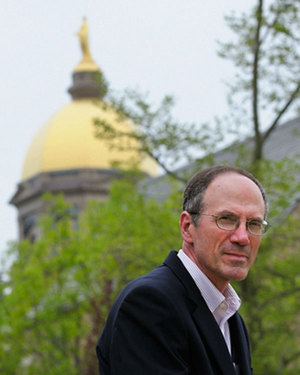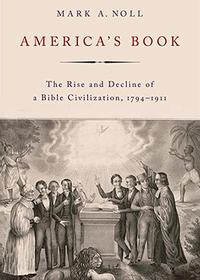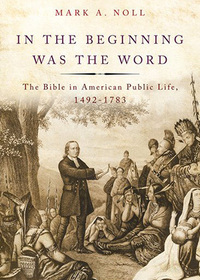
- University of Notre Dame
- Francis A. McAnaney Professor of History Emeritus
- Residential Fellow (2014-2015)
- "The Bible and American Public Life, 1789-1876"
Mark Noll is the Francis A. McAnaney Professor of History Emeritus at the University of Notre Dame. His books and most of his courses treat subjects related to the history of Christianity in the United States, Canada, and the modern world.
He is the author of America’s God: From Jonathan Edwards to Abraham Lincoln (2002), The Civil War as a Theological Crisis (2006), God and Race in American Politics: A Short History (2008), The New Shape of World Christianity: How American Experience Reflects Global Faith (2009), Jesus Christ and the Life of the Mind (2011), Protestantism: A Very Short Introduction (2011), In the Beginning Was the Word: The Bible in American Public Life, 1492-1783 (2016), co-author of Clouds of Witnesses: Christian Voices from Africa and Asia (2011), and co-editor of Protestantism after 500 Years (2016).
Professor Noll is a Fellow of the American Academy of Arts and Sciences. From 2004 to 2005 he served as the Maguire Fellow in American History and Ethics at the Library of Congress. In November 2006 he received the National Humanities Medal, and he has been the recipient of three year-long fellowships from the National Endowment for the Humanities.
Publications
-
America's Book: The Rise and Decline of a Bible Civilization, 1794-1911
Oxford University Press, 2022

America's Book shows how the Bible decisively shaped American national history even as that history influenced the use of Scripture. It explores the rise of a strongly Protestant Bible civilization in the early United States that was then fractured by debates over slavery, contested by growing numbers of non-Protestant Americans (Catholics, Jews, agnostics), and torn apart by the Civil War.
This first comprehensive history of the Bible in America explains why Tom Paine's anti-biblical tract The Age of Reason (1794) precipitated such dramatic effects, how innovations in printing by the American Bible Society created the nation's publishing industry, why Nat Turner's slave rebellion of 1831 and the bitter election of 1844 marked turning points in the nation's engagement with Scripture, and why Theodore Roosevelt and Woodrow Wilson were so eager to commemorate the 300th anniversary of the King James Version of the Bible.
Noll's magisterial work highlights not only the centrality of the Bible for the nation's most influential religious figures (Methodist Francis Asbury, Richard Allen of the African Methodist Episcopal Church, Catholic Bishop Francis Kenrick, Jewish scholar Solomon Schechter, agnostic Robert Ingersoll), but also why it was important for presidents like Abraham Lincoln; notable American women like Harriet Beecher Stowe, Elizabeth Cady Stanton, and Frances Willard; dedicated campaigners for civil rights like Frederick Douglass and Francis Grimké; lesser-known figures like Black authors Maria Stewart and Harriet Jacobs; and a host of others of high estate and low. The book also illustrates how the more religiously plural period from Reconstruction to the early twentieth century saw Scripture become a much more fragmented, though still significant, force in American culture, particularly as a source of hope and moral authority for Americans on both sides of the battle over white supremacy-both for those hoping to fight it, and for others seeking to justify it. -
In the Beginning Was the Word: The Bible in American Public Life, 1492-1783
Oxford University Press, 2015

In the beginning of American history, the Word was in Spanish, Latin, and native languages like Nahuatal. But while Spanish and Catholic Christianity reached the New World in 1492, it was only with settlements in the seventeenth century that English-language Bibles and Protestant Christendom arrived. The Puritans brought with them intense devotion to Scripture, as well as their ideal of Christendom – a civilization characterized by a thorough intermingling of the Bible with everything else. That ideal began this country’s journey from the Puritan’s City on a Hill to the Bible-quoting country the U.S. is today. In the Beginning Was the Word shows how important the Bible remained, even as that Puritan ideal changed considerably through the early stages of American history.
Author Mark Noll shows how seventeenth-century Americans received conflicting models of scriptural authority from Europe: the Bible under Christendom (high Anglicanism), the Bible over Christendom (moderate Puritanism), and the Bible against Christendom (Anabaptists, enthusiasts, Quakers). In the eighteenth century, the colonists turned increasingly to the Bible against Christendom, a stance that fueled the Revolution against Anglican Britain and prepared the way for a new country founded on the separation of church and state.
One of the foremost scholars of American Christianity, Mark Noll brings a wealth of research and wisdom to In the Beginning Was the Word, providing a sweeping, engaging, and insightful survey of the relationship between the Bible and public issues from the beginning of European settlement. A seminal new work from a world-class scholar, this book offers a fresh account of the contested, sometimes ambiguous, but definite biblical roots of American history.